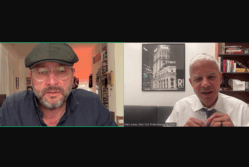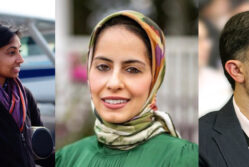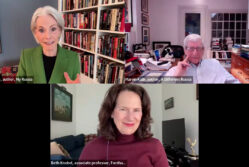Event Coverage Highlight

Panelists Discuss the Future of Journalism and Mentorship With The Media Line
By Chad Bouchard
June 13, 2017 – Many journalists and media watchers have voiced growing concern about the future of journalism in an era of constant challenges and uncertainty. With diminishing trust in traditional media, sound reporting dismissed as “fake news” and blatant falsehoods passing for news content, the information stream has been polluted.
“Many of us are disgusted when we look at the media and try to understand what is going on,” Felice Friedson, president and CEO of The Media Line, an American news agency covering the Middle East, told attendees during a recent forum at the OPC. “I tell you that our forefathers would turn in their graves.”
Friedson made her remarks on Tuesday, June 13 at an event that the OPC and The Media Line co-hosted to discuss the crucial link between policy and journalism and to celebrate the agency’s Press and Policy Student Program. The program offers students studying journalism, public policy or international relations one-on-one mentorships, either remote or on-site in the Middle East with The Media Line news bureau’s veteran journalists. Selected students can earn academic credit or pursue independent study.
Allan Dodds Frank, former OPC president, kicked off the event with introductory remarks, highlighting shared goals between The Media Line and the Overseas Press Club Foundation.
“One is to assure the world that it has a free flow of information of facts,” Frank said. “And we also care greatly about educating young people to become competent professional journalists who can help the rest of the world understand what’s going on.”
Former OPC President David Andelman, who serves on the program’s Board of Professional Advisers, helped to facilitate the event.
“Where are we today if we don’t have a press that’s not just free but a press that’s reliable and responsible?” Friedson asked. “The bottom line is that it’s about being complete. That’s what we teach our students.”
Friedson said The Media Line has trained four dozen young students with internships at the Jerusalem bureau over the last decade.
During the event, she announced the launch of the distance learning partnership with six universities around the world, where students are paired with mentors remotely in The Media Line’s Middle East bureau to help them shape and strengthen stories. The Media Line recently wrapped up a pilot program at Florida Atlantic University. Other partners include the Middle East Studies Department at King’s College in London, Al-Quds University in the Palestinian territories as well as the University of Houston, University of Denver and University of Miami, with about 50 more currently discussing partnerships.
In introducing the program, writer and media consultant Neil Berro lauded The Media Line’s “commitment to an honest brokering to find the truth, to work with people of all sides.”
During introductory remarks, long-time The Media Line adviser Marvin Kalb, Edward R. Murrow professor at Harvard and senior fellow at the Joan Shorenstein Center on the Press, Politics and Public Policy, addressed journalism’s rapidly changing landscape and the effect of financial pressure on the quality of reporting.
“Everywhere you turn today the idea of the internet is central to the way in which we get information and the way in which we communicate with one another,” he said. “And that has, in my opinion, coarsened what was once a beautiful, honest pursuit of fact. Today we look at a time when money and technology will end up determining what is on the air or what is published.”
Kalb said despite these challenges, he remains optimistic in the light of passion and tenacity he sees in journalism’s next generation.
“It’s much more difficult for them now than it was for me in my time, but somehow or another I’m absolutely persuaded that they are going to do it. They’re going to pull it off, and we’re all going to be the better for it.”
During the program, Friedson interviewed three alums of the program who worked at The Media Line bureau.
Liana B. Baker, who is currently a business journalist at Reuters covering mergers and acquisitions, recalled the early days of her internship in 2006, when the Lebanon War was dominating headlines.
“You had me look at some of the sectarian strife in Lebanon and how there’s different sects of Muslims and Christians. I wrote sort of an explainer, and that was a whole new subject for me. That’s where [The Media Line] is really great,” she said, “Finding the stories in the Middle East that no one else is covering. Where else could you read an explainer on groups in Lebanon?”
Baker was attending Northwestern University at the time of her internship.
Katie Beiter, who worked in the Middle East, wrote a total of about 50 stories for The Media Line during her stint there after studying at Rice University, a file that Friedson said works out to an average of about one story every day.
“I joke with Felice that I racked up quite the international phone bill, and I had a permanent kink in my neck from all the time I spent on the phone, Beiter said. But it was my first dip into learning how to research, be inquisitive, synthesize that information and then learn how to impart it.” She will do that next semester studying at Columbia University with an emphasis on Human Rights.
Asaf Zilberfarb, a recent graduate of Dartmouth College who interned at The Media Line during the rise of ISIS in 2014, said one of his first assignments was to pose as a prospective ISIS joiner from London, using social media to approach recruiters to see how far he could get.
“We got pretty far,” he said. (“Too far,” added Friedson.) “We were contacted by a lot of people and it really provided us with a lot of insight as to how this kind of movement and flow of people happens, and how easy it is, and how surveillance doesn’t really exist in the virtual space, at least not then.”
Zilberfarb, who speaks Arabic, spent much of his time translating local newspapers. He spoke about following the range of coverage and angles across Arabic media on a single story, like the boycott of Qatar.
“One of the things I learned from Michael [Friedson] and Felice and the other people in the newsroom is this idea that there isn’t a single truth. It’s about completeness. It’s about providing different narratives to the same story. And that couldn’t be more important than political work and in policy work,” Zilberfarb said. He will take the press to policy paradigm to economics at Ernst Young.
Peter Yarrow, renowned singer from the folk trio Peter, Paul and Mary, spoke about the crucial link between policy and journalism.
“Something is happening in this administration that is so fascinating and so mesmerizing that the substance of what is going on and the context is obscured,” he said. “It’s increasingly difficult for the ordinary citizen to have the raw material to make decisions, and to resonate in their hearts with what it is that being shared so that they come to a conclusion. We can’t have a democracy unless people can synthesize information.”
Yarrow spoke about an organization he co-founded called Operation Respect that seeks to tackle bullying and bolster self-esteem. More than a decade ago, the group launched an educational program and curriculum called Don’t Laugh at Me, which has been disseminated in schools across the globe, including many in the Middle East. The program expanded after an op-ed written by Felice Friedson alerted the US Embassy to the program which the embassy ultimately sponsored, a development that Friedson points out illustrates the link between media and policy. The program is now in 60 percent of Israeli schools and preparing to launch in the Palestinian territories. Yarrow also performed the song Weave Me the Sunshine, and led a singalong with attendees.
Friedson then spoke with Arthur and Shirley Sotloff, the parents of Steven Sotloff, an American journalist who was held hostage by ISIS for a year before he was brutally killed in August 2014. Steven filed stories for The Media Line while working in the Middle East, and was in close contact with Friedson in the days before his disappearance.
Friedson read passages from some of Steven’s work, pointing out stinging ironies about his reporting in 2013 that presaged current news. “‘Many Syrians are puzzled why Russia is propping Assad up,’” Friedson read from one of Steven’s articles published in May 2013. “‘Some believe Moscow is merely trying to remain relevant in a post-Cold War era.’” Steven wrote that article just four days before ISIS abducted him.
She said Steven was frustrated that news agencies would not publish his reporting on the development of ISIS in Libya, and yet today the story remains a solemn reminder of journalism that could have affected policy had his voice been heeded.
Friedson recalled talking to Steven over the last weekend before he disappeared, asking him if he trusted his fixer. “Steven was a bit naive, frankly. But on the other hand he was one of the most brilliant young journalists that we’ve ever seen in terms of understanding what was happening in front of us.”
Shirley Sotloff remembered seeing seeds of Steven’s interest in journalism and narrative at a very young age, writing “scary stories” as early as six years old, and later resurrecting his high school newspaper and becoming editor in chief. She said he showed a great interest in the stories of his grandparents, who were Holocaust survivors. “He would listen to his grandma and grandpa talk about the atrocities that happened to them, to their families as they lost everyone in the Holocaust,” she said. Steven later pursued journalism at the University of Central Florida.
Arthur Sotloff said Steven was deeply curious and had a knack for getting people to open up to him.
Arthur remembered that in high school, while working to revive the school newspaper, Steven made a point of sitting at different tables during lunchtime so he could talk with different people each day.
“I miss him a lot,” Arthur said.
He added that Steven was one of the first reporters on the scene after the 2012 attack on US facilities in Benghazi, Libya, and was able to track down and interview guards at the facility whose version of events contradicted the US government’s narrative.
“He was just trying to make aware of what was going on that nobody else was reporting. And that’s why he went into Syria. He was the voice of the voiceless.”
In concluding the event, Friedson said that The Media Line pushes students to find material outside of their comfort zone, and to be thorough in their reporting. She encouraged attendees to become involved in mentorship for young journalists.
“This is our future,” Friedson said. “This is how we take back journalism.”









